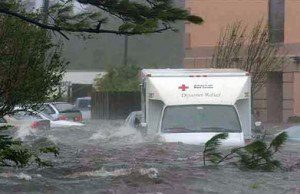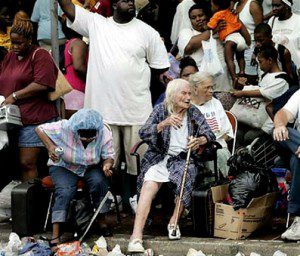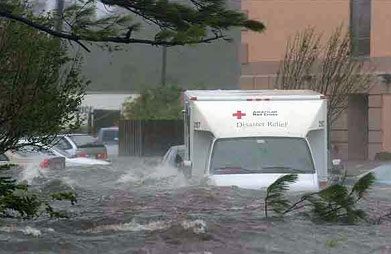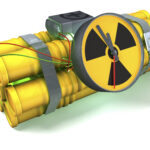34% of bodies recovered from the New Orleans metro area after Katrina were found in Hospitals and Nursing Homes – Where was the Outrage?
 As a boy I heard the story how some pirates tortured and murdered their captives in a way that seemed infinitely crueler than simply pushing them off the plank. It involved lashing them firmly to a piling at low tide so that their mouth and nose were only three inches below the high tide mark; as the tide came in the victims could feel the water rising inch by inch until it was up to their neck and as they panicked, it slowly rose to the point they were forced to inhale the water itself, choking and gagging for a few minutes and ultimately succumbing when they could no longer get air. Like drowning in any case where air is available slightly out of reach, this is a torturous way to die. The point of this will come later.
As a boy I heard the story how some pirates tortured and murdered their captives in a way that seemed infinitely crueler than simply pushing them off the plank. It involved lashing them firmly to a piling at low tide so that their mouth and nose were only three inches below the high tide mark; as the tide came in the victims could feel the water rising inch by inch until it was up to their neck and as they panicked, it slowly rose to the point they were forced to inhale the water itself, choking and gagging for a few minutes and ultimately succumbing when they could no longer get air. Like drowning in any case where air is available slightly out of reach, this is a torturous way to die. The point of this will come later.
In what really seems like a completely surreal trip down the rabbit hole, I read an AP article run in the Washington Post and USA Today, describing that seven years after hurricane Katrina, nursing homes were largely unprepared to respond to natural disasters. A preliminary review nursing homes was relatively positive – 92% self-reported having an Emergency Management Plan in place. However, after in depth staff interviews at 24 of them, the vast majority failed miserably across a wide variety of patient-centered safety and security categories. This is a problem for all of us because as our parents age, virtually all of us will be faced with a decision about housing our parents in a nursing facility (the article states that 3M Americans are in one of the 16,000 Nursing Homes in a given year). If these facilities are not ready to protect patients in a disaster scenario, we could be writing our loved-ones off to a terrible fate. An example of being unprepared was cited from the article: St. Rita’s, where 35 patients died during Katrina, several who drowned while strapped into their wheelchairs and beds while the water rose to cover their faces. All of the New Orleans hospitals that decided to “Protect in Place†rather than evacuating, created similar horror stories. The results of this report demonstrate that lessons were not learned or that people simply do not care. This is outrageous; we are not talking about an abstract issue here – it is life and death.
 Having had my own mother evacuated three times in ten years from a New Orleans nursing home, it was a mystery why many facilities decided to ride the storm out and “protect in place†despite three days advance warning of Katrina’s location, intensity and potential for destruction; it was a slow motion train wreck and nobody switched the tracks. A 2004 $1M disaster management exercise called PAM, foretold the results of Katrina with amazing accuracy, down to the failure of the levees and the 18ft. flooding. The horror of living through this nightmare is detailed in our book “Deadly Neglect – Apathy and Denial vs. Act of Godâ€, which is the real life account of a group of nurses trapped in hospitals in the aftermath of Katrina without electricity, dwindling food, medical supplies, drugs, stray bullets flying and no physical security for many days. The underlying purpose of the book is quoted throughout: “So this will never happen again.†Unfortunately, too many of the guidelines that would mitigate this type of tragedy are voluntary and the true enablers, including lack of political will, a profit motive and making people accountable for their accepted roles and responsibilities in these situations, are not taken seriously by those who are responsible to protect a trusting public. This is not an issue that will go away for most people; when family members live in one of these facilities, they will be more vulnerable in direct relation to the weaknesses in operation of the organization’s Emergency Management Plan.
Having had my own mother evacuated three times in ten years from a New Orleans nursing home, it was a mystery why many facilities decided to ride the storm out and “protect in place†despite three days advance warning of Katrina’s location, intensity and potential for destruction; it was a slow motion train wreck and nobody switched the tracks. A 2004 $1M disaster management exercise called PAM, foretold the results of Katrina with amazing accuracy, down to the failure of the levees and the 18ft. flooding. The horror of living through this nightmare is detailed in our book “Deadly Neglect – Apathy and Denial vs. Act of Godâ€, which is the real life account of a group of nurses trapped in hospitals in the aftermath of Katrina without electricity, dwindling food, medical supplies, drugs, stray bullets flying and no physical security for many days. The underlying purpose of the book is quoted throughout: “So this will never happen again.†Unfortunately, too many of the guidelines that would mitigate this type of tragedy are voluntary and the true enablers, including lack of political will, a profit motive and making people accountable for their accepted roles and responsibilities in these situations, are not taken seriously by those who are responsible to protect a trusting public. This is not an issue that will go away for most people; when family members live in one of these facilities, they will be more vulnerable in direct relation to the weaknesses in operation of the organization’s Emergency Management Plan.






0 Comments